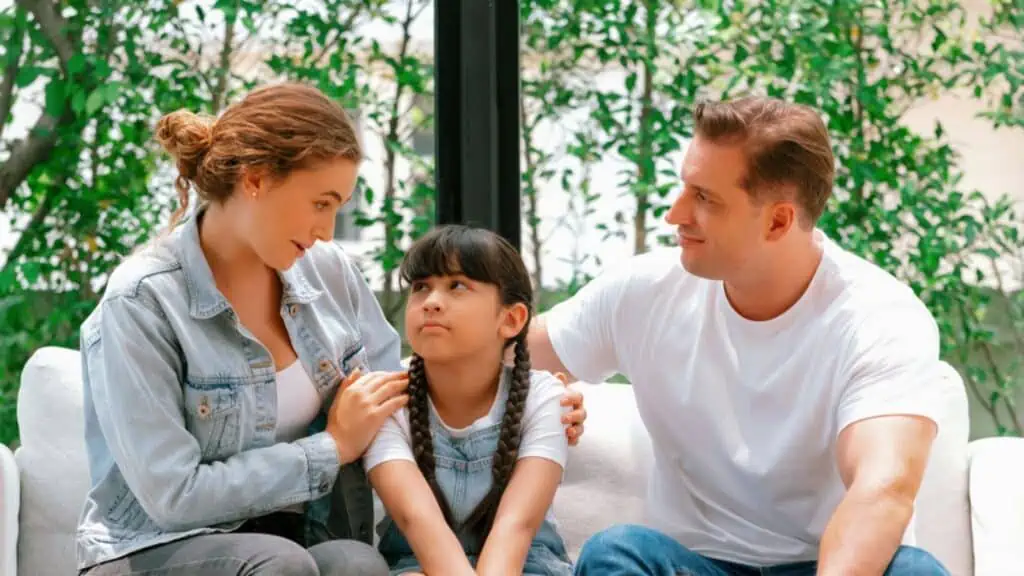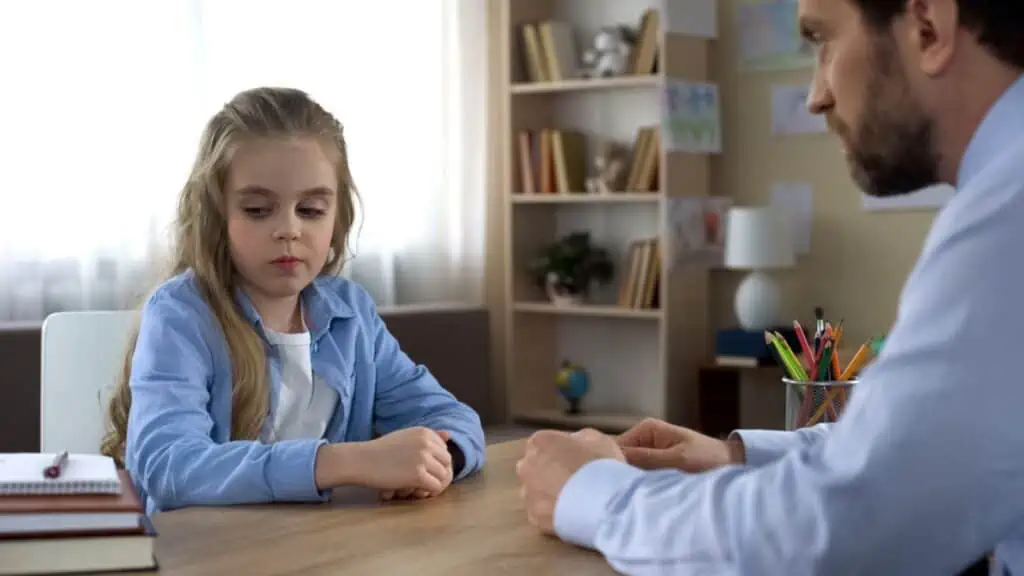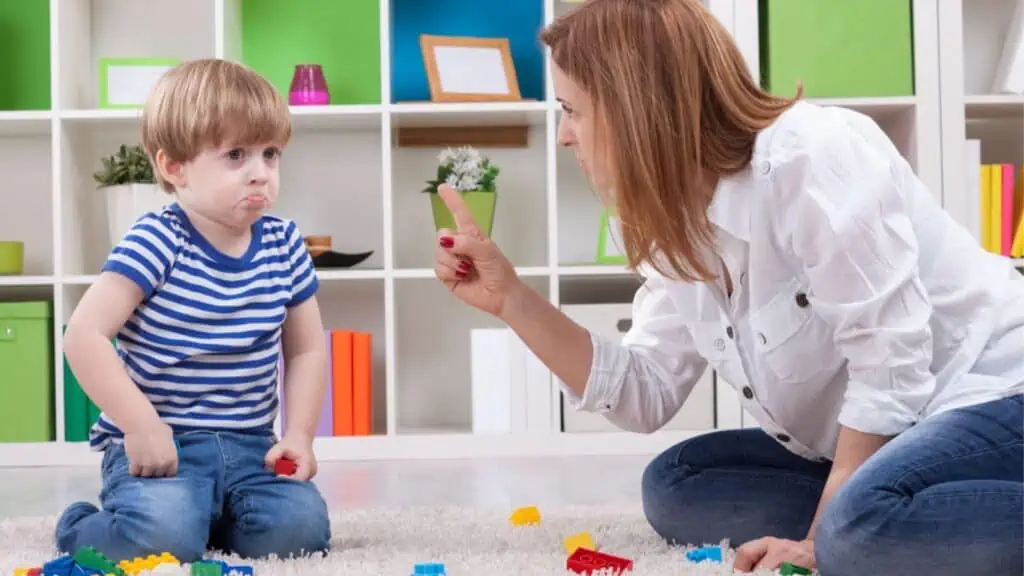16 Phrases Only Toxic Parents Use
This post may contain affiliate links. As an Amazon Associate, I earn from qualifying purchases.
Good parenting is about more than providing a balanced diet, a warm bed, and school tuition; it’s about nurturing a child and developing the whole person. The words we use are the fertilizer that nourishes a child, and they can cause great harm if they’re negative. Even if you say you love your child unconditionally, experts say a child can doubt that love due to constant toxic phrases.
A parent’s words can significantly impact their children’s emotional and mental well-being. Some phrases, often said without realizing their harmful effects, can leave lasting emotional scars. Unfortunately, the real impact of these words is realized when it’s too late, and the child is no longer a child but a struggling adult.
Frustrated and tired parents might say these phrases without realizing the repercussions. Recognizing these and transitioning to using positive alternatives, and fostering healthy family dynamics is a great start.
1. “Why are you always moody?”

Have you heard a parent use this phrase when a child is sad or hurt? This phrase dismisses a child’s emotions and can make them feel misunderstood and invalidated. It suggests that their feelings are a burden.
This can erode self-esteem and create an environment where children feel they must hide their emotions. “I’m here to listen if you want to talk about what’s on your mind.” Is a better response to a child’s emotions.
2. “You’re Okay, Stop crying!”

Telling a child to stop crying minimizes their feelings and teaches them that expressing emotions is wrong. Crying is a natural and healthy way of processing emotions, and children must understand this.
Instead, try saying, “It’s okay to cry, let it out. I’m here for you.” This phrase validates the child’s feelings and teaches them that expressing emotions is acceptable.
3. “You’re so lazy!”

Using labels like “lazy” or “stupid” can cause a child to internalize the label and believe it’s who they are. This damaging phrase can lead to low self-esteem and a lack of motivation. If your child is lagging behind on tasks, work together to find strategies to help them.
Instead, try saying, “I noticed you haven’t completed your chores yet. Is there anything I can do to help you?” This phrase addresses the specific behavior without labeling the child.
4. “You never listen!”

This is another phrase that uses a label and creates a negative self-image for the child. It also suggests that their thoughts and opinions are not valued, which can impact their confidence.
Instead, try saying, “I feel like my words aren’t being heard right now. Can we talk about how we can better communicate with each other?” This phrase acknowledges your feelings while also encouraging open communication.
5. “I wish you were more like …”

Comparing your child to another is a parental toxic trait. This can have long-term effects on their self-esteem and confidence. Children need to feel accepted and loved for who they are, not compared to someone else.
Instead, try saying, “I appreciate the unique qualities you have. Let’s focus on your strengths and how we can build upon them.” This phrase acknowledges their individuality and encourages a positive self-image.
6. “You’re just like your mother/father!”

Negatively comparing a child to their parent, whom you regard lowly, can create a toxic environment. It creates unnecessary tension between the child and their parent and can also impact their self-worth.
Address the child’s frustrations and focus on resolving issues without bringing up past conflicts. It’s best to address the current situation without involving negative comparisons to family members.
7. “You’re too Fat (or Skinny).”

Body shaming comments coming from anyone are bad enough, but coming from a parent can severely damage a child’s self-image and self-worth. It can lead to the development of eating disorders and body image issues. Children need to feel loved and accepted, regardless of their physical appearance.
Love the children just the way they are. Teach them to focus on being healthy and taking care of their bodies. This will encourage a positive self-image and promote healthy habits rather than focusing on physical appearance.
8. “Big boys (or girls) don’t cry.”

This phrase enforces harmful gender stereotypes and teaches children to suppress their natural emotions. Children, regardless of their gender, should be allowed to express their feelings without judgment.
Encourage children to cry no matter their gender. Always be open to talk about what they’re feeling. This will promote emotional intelligence and encourage children to express their emotions openly.
9. “Stop being so sensitive.”

Dismissing a child’s sensitivity can make them feel ashamed and misunderstood. Acknowledging and validating a child’s emotions is important, even if they seem small or insignificant.
Instead, try saying, “I understand that this situation is difficult for you. Let’s work together to find a solution.” This shows empathy and encourages problem-solving rather than dismissing the child’s feelings.
10. “People have it worse than you!”

Comparing a child’s struggles to others’ can invalidate their feelings and experiences. One person having a hard time doesn’t diminish another person’s struggles. It’s important to validate and support a child’s emotions through their challenges.
Acknowledging when things are tough for them and saying, “Let’s figure out how we can make things better” is better. This phrase shows empathy and encourages finding solutions rather than dismissing the child’s struggles.
11. “I’m doing this for your own good.”

Using this phrase to justify harsh actions or decisions can breed resentment and mistrust. Children must feel that their parents trust them and have their best interests at heart.
Instead, try saying, “I understand this may be difficult for you right now. However, I believe it’s important for your well-being in the long run.” This phrase shows empathy and encourages open communication instead of using authority to justify actions.
12. “Why can’t you be more like your sibling?”

Comparing children can create sibling rivalry and feelings of inadequacy. Each child is unique and should be appreciated for their individual qualities. They should not be compared to each other.
Instead, try saying, “I love you both for who you are. Let’s focus on your own strengths and how we can work on them together.” This phrase encourages self-acceptance and promotes a healthy relationship between siblings.
13. “You always mess things up.”

Using negative labels like “always” or “never” can damage a child’s self-esteem and create a negative self-image. It also suggests that mistakes are not acceptable, which can lead to fear of failure.
Instead, try saying, “Everyone makes mistakes, and that’s how we learn. Let’s figure out what went wrong and how we can do better next time.”
14. “You’ll never amount to anything.”

Statements like this can destroy a child’s confidence and motivation. They create a negative self-image and can lead to feelings of inadequacy. Children need to know their parents are proud of them.
Instead, try saying, “I have faith in you and believe that you can achieve great things. Let’s work together to figure out how we can reach your goals.” This phrase encourages positive thinking and motivates the child to strive for success.
15. “You’re too emotional.”

Telling a child that they are “too emotional” can make them feel invalidated and ashamed of their feelings. This can lead to a suppression of emotions and potential difficulties in expressing and managing their feelings in the future.
Instead, try saying, “I see that you’re feeling a lot right now. Let’s talk about what’s going on and how we can handle it together.” This phrase acknowledges their emotions and encourages a healthy dialogue about feelings.
16. “You’ll understand when you’re older.”

Using this phrase to dismiss a child’s curiosity or concerns can make them feel dismissed and undervalued. It can discourage them from asking questions or seeking understanding in the future.
Instead, try saying, “This is a complex issue, but let’s see how much we can understand together right now.” This approach respects the child’s desire for knowledge and involves them in the learning process, fostering a sense of involvement and respect.
20 Strong Words Parents Should Never Say to Their Kids

Countless adults sitting in a therapist’s office today are grappling with the lasting impact of words spoken by their parents during childhood. Regardless of how you perceive yourself, in your child’s eyes, you are nothing short of the most remarkable thing to happen to them since “skip intro.” This underscores the critical importance of being mindful of what you say to your children, as your words become the small but influential voice in their developing minds.
20 Strong Words Parents Should Never Say to Their Kids
16 Common Phrases Grandparents Should Stop Saying to Their Grandkids

Do you still remember something your grandparents said that made you uncomfortable? As much as we adore our grandparents, their words (even with good intentions) can sometimes hurt our feelings or are plain embarrassing.
If you are a grandparent, using your words mindfully around your grandkids is as crucial as any other relationship. Words hold immense power and shape our kids’ behaviors and perceptions.
16 Common Phrases Grandparents Should Stop Saying to Their Grandkids







